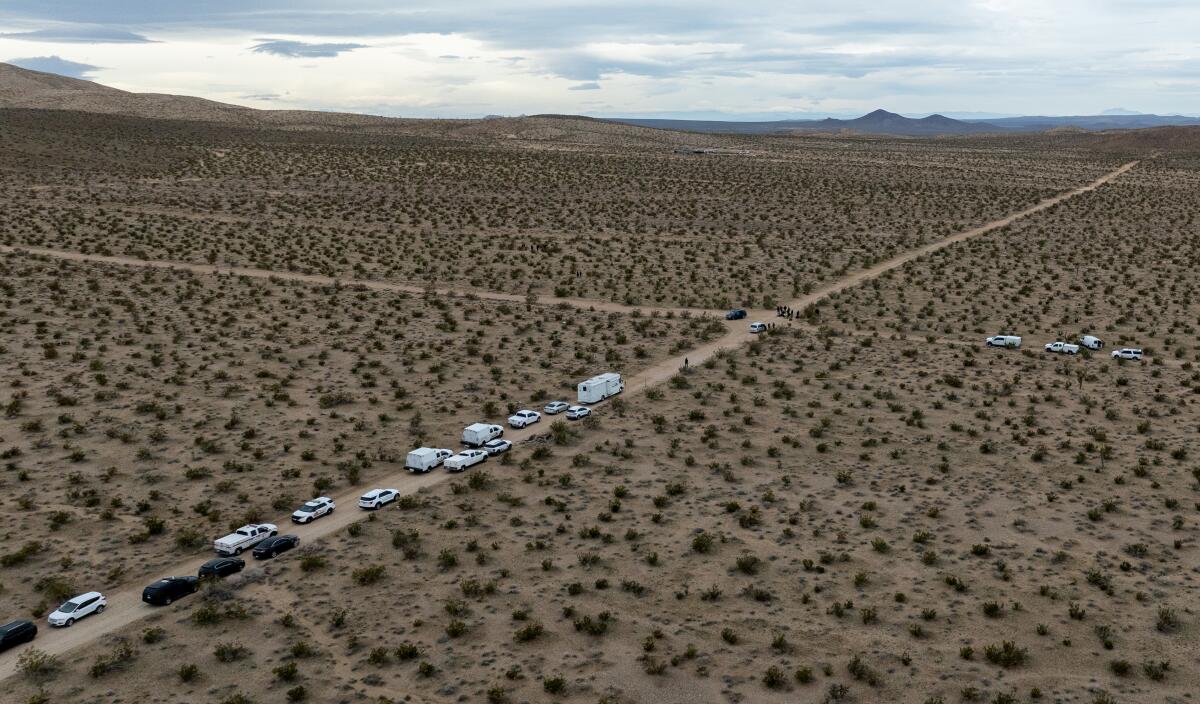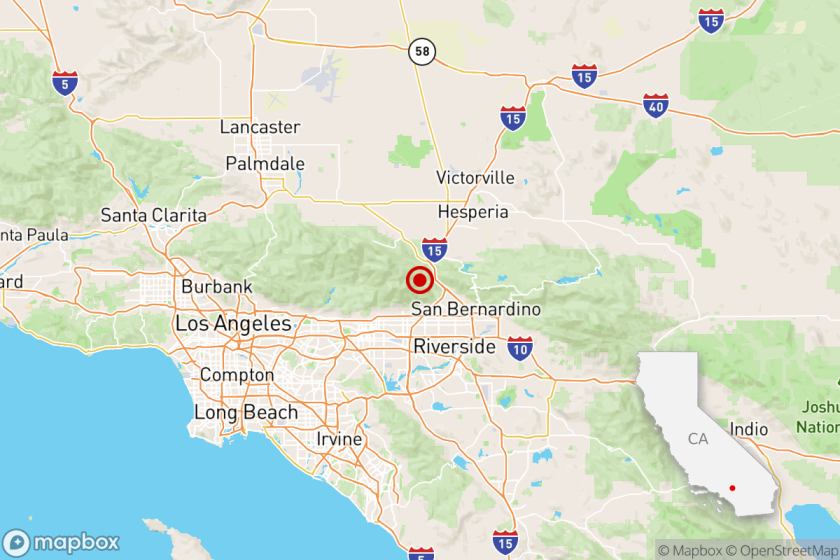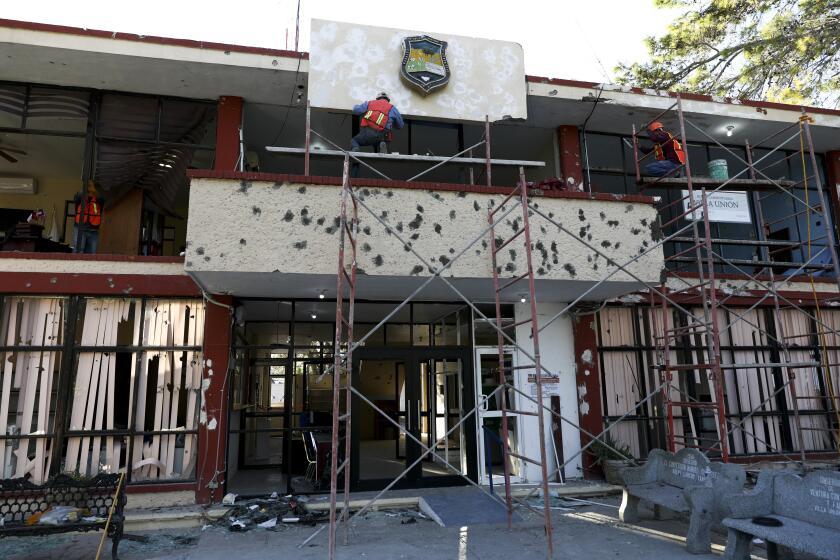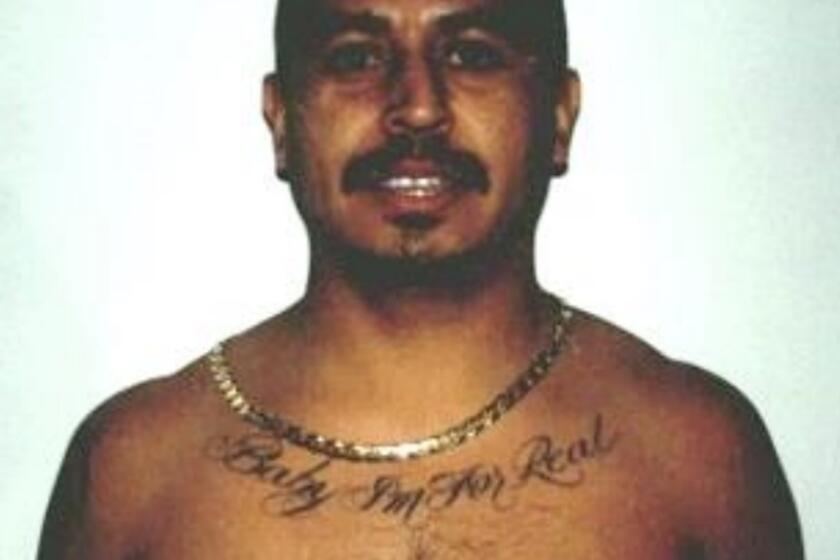Mystery shrouds six bodies found in San Bernardino desert. Could it have been gang-motivated?

- Share via
Several days after authorities discovered six bodies in the remote El Mirage desert in San Bernardino County, questions remain among experts on whether the deaths could be a gang- or cartel-related killing.
Information that investigators have yet to release — the age of the dead and their criminal history, for example — would help give a better idea of a possible motive to the slayings, experts say.
“When you see the bullet casings, the number of people who were killed, the fact that the vehicle was left in the middle of the desert without any attempt to hide it, it speaks to a certain kind of audacity that makes you think it’s linked to some kind of organizational crime,” said Peter Hanink, a professor of sociology and criminology at Cal Poly Pomona.
“But whether it’s part of Mexican drug cartels, I don’t see evidence for that so far.”
San Bernardino County sheriff’s deputies responded to a wellness check around 8:15 p.m. Tuesday in an isolated desert area near Lessing Avenue and Shadow Mountain Road, near U.S. Highway 395 in El Mirage, according to Sheriff’s Department spokesperson Mara Rodriguez. El Mirage is about 50 miles northeast of Los Angeles.
Five bodies were initially found, but Rodriguez said a sixth was discovered Wednesday morning. The California Highway Patrol’s Aviation Division also assisted in the case. The investigation is ongoing; officials haven’t released details about when or how the people died. Their identities hadn’t been released as of Friday.
A news conference is expected to be announced next week if further information is available, Rodriguez said.
The quake, which struck near San Bernardino, is the second to rattle Southern California in less than a week.
“We thank the public and our media partners for their patience as we conduct a careful and thorough investigation to bring justice to the families of those affected,” she said.
Although officials wouldn’t confirm if the bodies had gunshot wounds or had been burned, footage from TV stations showed shell casings around the area and at least one of the vehicles filled with bullet holes. ABC7 also reported that the bodies appeared to be burned.
Though some law enforcement sources have suggested the deaths could have resulted from organized crime or cartel violence, Hanink said that cartels are often poorly understood and serve as a “kind of boogeyman” that people automatically think of when crimes of this nature occur.
“If you’re talking about Mexican cartels, they almost exclusively operate regionally,” he said. “You’ll occasionally see it in the U.S., and it’s usually people trying to flee the cartel to the U.S. and the cartel tracks them down. You don’t have cartels generally operating within the U.S.”
Hanink, who doesn’t have any further information about the case, also said the fact that federal agencies don’t appear to be involved in the investigation suggests there isn’t an international link.
“If this were linked to cartels, as in international criminal organization operations in the U.S., then almost certainly the FBI and Homeland Security would be involved,” he said. “If drug cartels were suspects, presumably the DEA would be involved.”
Mexico’s army is finding belt-fed machine guns, rocket launchers and grenades that are not sold for civilian use in the United States.
David Pyrooz, a professor of sociology at the University of Colorado Boulder who studies gangs and criminal networks, agreed that it is too early to draw any conclusions about a possible motive. Pyrooz also has no further information about the incident beyond reading news articles.
What stood out to Pyrooz were the number of victims, the fact that they were driven to a remote area and that their bodies were burned. He said that while it is possible that the deaths were carried out by a street gang, it would be an “outlier” based on how gang killings usually go.
“It’s usually drive-by shootings and victims die en route to the hospital as opposed to more premeditated efforts to remove someone from a location and take them to a remote area,” he said.
Pyrooz also emphasized the difference between gang-related crime — violence that occurs between people who are somehow affiliated with a gang — and gang-motivated crime, which he said is carried out to further the status of a gang or to seek revenge against a rival gang.
“In California, it tends to be more neighborhood groups,” he said. “It’s not like the gang spans the city and across geographic locations. The crimes either occur in some staging area like a park or a mall or a school or it occurs outside of a house or location of a neighborhood where you’re trying to seek revenge on another group.”
Los Angeles County prosecutors allege that Juan ‘Termite’ Romero set fire to a crowded apartment building, killing seven children and three women.
It’s not common for gangs to venture outside of their neighborhoods, according to Pyrooz.
“I highly doubt based on where this took place that there are gangs that are active in this area,” he said.
To better gauge a possible motive, Pyrooz said he would be looking for the age of the victims, their criminal histories and any kind of groups or affiliations they might have had. He also would look to see if they had any ties to drugs.
Based on the information out there, it appeared to Pyrooz that the people had access to one another and there was some level of trust that would allow them to be in one another’s company.
“There are a lot of people who use leaps of logic to say they’re cartel hits or organized crime groups, but we really don’t know yet,” he said. “I worry about the narrative that’s getting in front of the investigation.”
More to Read
Sign up for Essential California
The most important California stories and recommendations in your inbox every morning.
You may occasionally receive promotional content from the Los Angeles Times.













